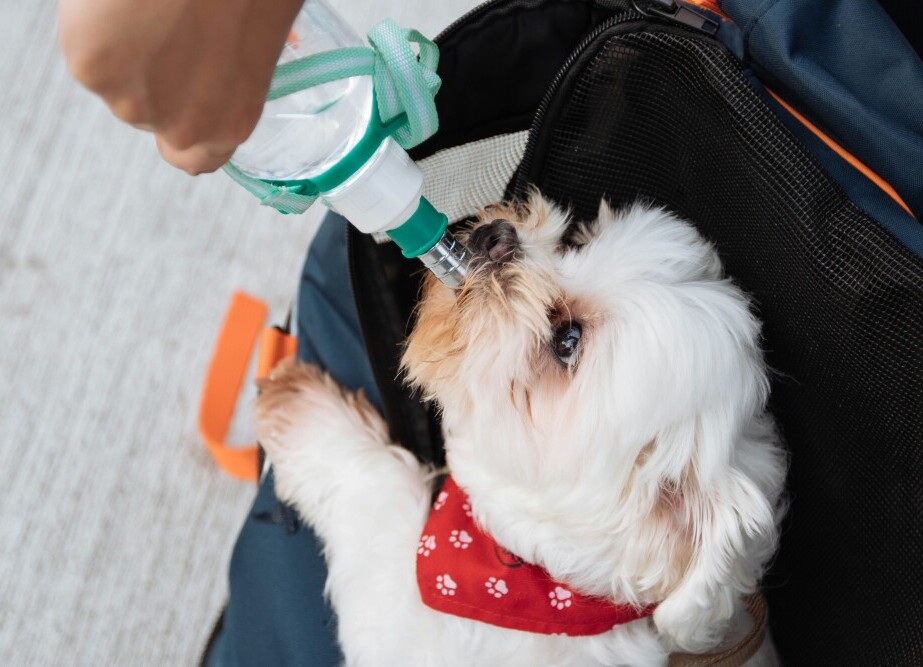
A few of the links in this post are affiliate links. If you buy something, we may earn a small commission (no extra bones from your wallet 🐾). Thanks for helping support the site and all of the dog adventures!
Every pup’s journey from the bouncy early days to their wise senior years is unique, and so is the care they need. Understanding what your doggo needs at each stage helps keep them healthy and happy throughout their lives. We’re here to help you do just that, so you can maintain a healthy dog through every stage of their life.
Different life stages mean different care requirements. Puppies need a lot of guidance as they explore a new world. They’re all about energy and adventure, but they also need specific nutrients and medical care to boost their early development.
As they grow into adulthood, the focus shifts to maintaining their health and managing their activity levels. Then, in the senior years, things slow down. It’s all about comfort and addressing age-related changes. Hip and joint issues become more prevalent and they may become less active.
Tailoring care to fit these stages helps avoid potential health issues and improves the quality of life. It’s about delivering the right care at the right time, preventing problems before they arise, and dealing with any issues head-on. Preventative care is better and cheaper than reactive care when the damage has already been done. Do things now that keeps your pup healthy for years to come.
Whether it’s adjusting diet, changing exercise routines, or making their environment more accommodating, paying attention to their life stage is crucial. By recognizing these stages, you not only ensure that your furry friend is getting their needs met but also strengthen your bond with them by being attentive and responsive. It’s a proactive approach that ensures a long, healthy life filled with happy moments.
Diet needs change as dogs grow. Learn what’s right at each stage in Dog Nutrition 101: Feeding for Every Life Stage.

Puppies: Laying the Groundwork for a Healthy Life
Raising a puppy is like setting the foundation for a skyscraper—it needs to be solid and strong to support a happy, healthy life. Vaccinations and regular health check-ups are the first steps in building a robust foundation. Keep your vet on speed dial for these crucial visits, which ward off diseases and ensure your pup is developing as they should.
When it comes to nutrition, puppies are like little fuel-burning machines. Their food needs to be rich in proteins, fats, and carbohydrates to support their rapid growth and energy bursts. High-quality puppy food tailored for their age and size will set them up for success.
Training and socialization are also key. Puppies are super impressionable, and this stage is the best time to teach them good manners and expose them to new environments, people, and other animals. This helps in shaping their behavior and making them confident, well-adjusted dogs. This is when they need to learn how to interact with other dogs and with humans.
Playtime is more than just fun for puppies—it’s an opportunity for exercise and learning. Engage them in activities that challenge their minds and bodies. Puzzle toys, fetch, and basic commands mixed with play all contribute to a smart, healthy pup. Puppies need to be active and play, so give them options and keep their bodies and minds busy with activities.
Health goes beyond diet and exercise. Explore a full approach in The Complete Dog Health and Wellness Guide.

Adulthood: Maintaining Robust Health and Activity Levels
Your dog is all grown up, and now it’s about keeping those tails wagging with top-notch care and activity. A balanced diet is key. Adult dogs need food that supports their energy levels, looks after their body weight, and takes into account their breed size. You’re looking at a diet rich in proteins for muscle maintenance, plus a good mix of carbs and fats.
Exercise isn’t just something your dog loves—it’s crucial for their overall well-being. Whether it’s daily walks, Frisbee in the park, or agility training, keeping your dog active helps manage their weight, boosts their mood, and reduces the risk of developing health issues. Keeping them active during this stage can help keep them from gaining weight and having health issues later on in life.
Routine health check-ups are the backbone of preventive care. Regular vet visits can catch any potential health problems early before they become major issues. It’s important to keep up with dental care, too. Clean teeth mean a happier, healthier dog. Keep your dog up to date on vaccinations and checkups.
Behavioral changes might pop up, and staying on top of re-training ensures your dog remains the well-mannered pup you brought up. It might just reinforce the good habits they’ve learned or help curb any naughty antics they might pick up. By now they have likely gotten used to a routine, so keep them comfortable by following.
Regular vet care starts early. Be prepared with First Vet Visit: Questions to Ask and What to Bring.

Middle Age: Adjusting Care for the Midlife Transition
As dogs hit their middle age, it’s all about tweaking their care routine to suit their changing needs. You might start noticing subtle shifts in their energy levels and activity preferences—it’s completely natural. Older dogs will play less than when they were in their younger years.
Dietary changes can make a huge difference now. Look for food options that support joint health and manage weight, as metabolisms begin to slow. Antioxidant-rich and fiber-rich foods can boost overall health and help with digestion issues that sometimes crop up. Diet that provides them with all the right nutrients will be key to keeping them strong and healthy into their later years.
Exercise remains important, but the type and intensity might need adjusting. Maybe cut back on those intense workouts and swap them for longer, leisurely walks or swimming, which is easier on the joints. Keep the activities engaging to ensure they’re having fun and staying active.
Regular check-ups are critical at this stage. Besides the usual health screenings, it’s essential to be on the lookout for early signs of arthritis or other age-related conditions. Working closely with your vet, you can adjust your dog’s care plan as needed, ensuring they’re comfortable and thriving.
Behavioral changes might occur, so it’s a great time to ensure that their training is still effective. Reinforcing positive behavior or addressing any new habits can help maintain a balanced lifestyle. They are close to their golden years and may start to slow down or become less rambunctious.
Good digestion supports overall well-being. Get insights in Understanding Your Dog’s Gut Health.

Senior Dogs: Ensuring Comfort and Quality of Life in Golden Years
As dogs enter their senior years, comfort and quality of life become top priorities. Their energy levels may dip, but there’s still so much joy to be had. Stay aware of any potential health issues that affect senior dogs such as hip displacement and bone loss.
Nutrition needs a rethink to keep them fit and healthy. Senior dog diets are typically lower in calories but richer in fiber, helping maintain a healthy weight and digestive system. Joint-support supplements, like glucosamine and chondroitin, can keep those old bones moving smoothly.
Managing common senior ailments, such as arthritis or vision and hearing issues, becomes part of the routine. Regular vet visits are essential to catch these early and manage them effectively. Your vet might recommend adjustments in their care routine to address these challenges.
Environmental changes can really help. Simple things like placing ramps over stairs, using non-slip mats, or providing comfy bedding keep them cozy and secure. Just like you would a senior person, make your home comfortable and easy to get around for your aging pup.
Even as routines change, quality interaction is key. Gentle play and mental stimulation through puzzles or new tricks can keep their minds sharp and spirits high. It’s about savoring every moment and ensuring your furry friend enjoys a happy, comfortable life surrounded by love. And with this we hope you find a way to keep your dog happy and healthy through every stage of their life.

